How Emotional Exhaustion in Codependency Impacts the Nervous System
Introduction
Emotional exhaustion in codependency is more than just feeling drained—it’s a physiological shutdown that affects every system in the body. When you live in constant emotional overdrive—pleasing, rescuing, anticipating, and managing other people’s emotions—your brain and nervous system remain in survival mode. Over time, this leads to burnout that isn’t cured by sleep or rest.
This article explores what happens to your nervous system when codependent emotional patterns take hold. We’ll dive into the brain’s stress pathways, neurotransmitter imbalances, and the biological reasons why it’s so hard to “just stop caring too much.” The goal isn’t to blame, but to understand—so healing can begin from the inside out. 🌿
Looking for supplements for This? Click here.
What Emotional Exhaustion Really Feels Like 🌧️
Emotional exhaustion isn’t ordinary tiredness—it’s a deep depletion of emotional and physical resources. You might feel numb, irritable, or hopeless. Your mind swings between anxiety and apathy. Tasks that once felt manageable become monumental.
In codependency, this exhaustion comes from living in a permanent state of hyper-vigilance. You’re always scanning for cues in others—tone shifts, silence, emotional distance. You absorb their moods and neglect your own. You become addicted to preventing problems and smoothing over tension.
The tragedy is that this constant external focus slowly erases your sense of self. Over time, your body starts to show the cost: fatigue, poor digestion, headaches, and disrupted sleep. These are signs that your nervous system is collapsing under the weight of unprocessed stress.
The Nervous System Under Siege ⚡

Your nervous system has two primary modes:
The sympathetic system (fight, flight, freeze)
The parasympathetic system (rest, digest, restore)
In codependency, the sympathetic system dominates. Your body stays in a state of chronic activation. Even small disagreements or silences can feel threatening, triggering surges of adrenaline and cortisol.
When this happens repeatedly, the nervous system loses flexibility—a concept called dysregulation. Instead of smoothly switching between activation and relaxation, your body becomes stuck in stress mode. You either feel anxious and wired (hyperarousal) or shut down and disconnected (hypoarousal).
This dysregulation explains why emotional exhaustion in codependency feels so unpredictable: one moment you’re anxious and panicked, the next you’re detached and numb. Your brain is oscillating between two survival extremes, unable to find calm equilibrium.
The Cortisol Trap 😣
Cortisol is your body’s main stress hormone. In short bursts, it’s helpful—it keeps you alert and focused. But in codependent relationships, cortisol often runs wild.
Each time you anticipate someone’s disappointment, suppress your needs, or try to fix a situation, your brain activates the HPA axis—the hypothalamic-pituitary-adrenal circuit that releases cortisol. When this happens daily, cortisol stops behaving like a friend and becomes a toxin.
Chronically high cortisol:
Damages the hippocampus (memory and emotional regulation)
Weakens the immune system
Disrupts sleep and energy balance
Suppresses serotonin (happiness) and GABA (calmness)
Eventually, the body can’t sustain the pressure. Cortisol output plummets—this is adrenal fatigue. You feel like you’re running on empty, but even rest doesn’t help. You’ve burned through your chemical reserves. 🔥
The Role of Dopamine: Chasing Validation 🎯
Dopamine drives motivation and reward. In healthy relationships, it reinforces trust and mutual support. But in codependency, dopamine gets hijacked.
Every time you gain approval or soothe conflict, your brain releases dopamine—a quick hit of relief. When you lose approval, dopamine crashes. This push-and-pull pattern turns your relationships into emotional slot machines, where you chase intermittent rewards.
It’s not weakness—it’s neurochemistry. Your brain becomes addicted to unpredictability. It learns that “winning” love feels euphoric, even if it comes after distress. This is why co-dependents often feel drawn to emotionally unavailable or volatile partners: their nervous system associates chaos with passion.
Over time, dopamine instability leads to burnout. The same behaviors that once brought relief now just cause exhaustion. The system runs out of fuel.
Serotonin and the Erosion of Self-Worth 🌫️
Serotonin stabilizes mood, regulates sleep, and creates a sense of internal peace. Chronic stress from codependency suppresses serotonin production.
With low serotonin, your mood becomes volatile. You start seeking external validation just to feel balanced. You overthink every text, conversation, or silence. The quieter the other person becomes, the louder your inner critic grows.
This chemical imbalance creates emotional dependency: your happiness depends on someone else’s reactions. Even when you know rationally that your fears are exaggerated, your body still feels unsafe.
Low serotonin also contributes to depression and fatigue—the emotional flatness that often follows long-term people-pleasing.
GABA and the Racing Mind 🌀
GABA (gamma-aminobutyric acid) is the neurotransmitter that calms brain activity. It’s your body’s natural brake pedal. But when stress is chronic, GABA signaling weakens.
You might notice this as constant mental noise—ruminating about what you said, what you should have said, or what others might think. You replay moments of tension, searching for where you went wrong. This is GABA depletion in action.
Without sufficient GABA activity, your brain can’t shut off. Sleep becomes shallow, anxiety feels amplified, and your capacity to focus shrinks. Your body remains on high alert, even during rest.
The Vagus Nerve and Emotional Regulation 🧘
The vagus nerve is the main communication channel between your brain and body. It helps regulate heart rate, digestion, and emotion. When the vagus nerve is strong (high vagal tone), you can recover quickly from stress. When it’s weak, you stay tense long after the danger passes.
Chronic emotional labor weakens vagal tone. You might notice shallow breathing, digestive issues, or a racing heart after minor stressors. This means your body no longer trusts itself to relax.
The key to healing lies in retraining the vagus nerve—through slow breathing, grounding exercises, gentle movement, and self-soothing rituals. These small practices signal to your body that it’s safe to release control.
Want to try Breathwork? Click Here.
The Freeze Response: When the System Shuts Down ❄️
When the nervous system is overwhelmed for too long, it can switch from overactivation to shutdown. This is the freeze response—the body’s last resort when it can’t fight or flee.
You might feel disconnected, apathetic, or emotionally numb. You may struggle to care about things that used to matter. This isn’t laziness—it’s the brain’s way of conserving energy.
The freeze state is common in advanced emotional exhaustion. It’s like a circuit breaker flipping after too much voltage. To recover, the goal isn’t to force motivation but to restore safety so your system feels ready to engage again.
The Cycle of Emotional Burnout 🔁
The emotional exhaustion of codependency creates a self-perpetuating loop:
You feel anxious and unsafe.
You try to control or fix others to regain safety.
You temporarily feel relief.
The stress returns stronger.
You collapse emotionally.
This loop mirrors addiction. Each cycle reinforces the brain’s belief that connection requires self-sacrifice. Over time, your baseline state becomes one of depletion.
Recovery begins when you break the cycle at the nervous-system level—by calming your body before trying to change your thoughts.
Healing the Exhausted Nervous System 🌿
True recovery from emotional exhaustion isn’t about becoming detached—it’s about reestablishing regulation. Healing requires giving your body experiences of safety, calm, and rest, over and over, until they feel familiar again.
Start by slowing down your physiology:
Practice deep breathing (especially longer exhales).
Engage in gentle movement like yoga, walking, or stretching.
Use warmth—like baths or weighted blankets—to signal safety.
Rest without guilt; your body is recalibrating.
On a biochemical level, certain nutrients can help support the healing process: magnesium (for GABA balance), omega-3s (for brain function), and adaptogens like ashwagandha or rhodiola (for cortisol regulation). But supplements are most effective when paired with emotional boundaries and self-compassion.
Remember: you’re not healing a bad personality—you’re healing a tired nervous system. 💛
From Hypervigilance to Inner Peace 🌈
As your body learns safety, everything changes. You no longer need to manage others’ moods to feel okay. You can tolerate discomfort without collapsing. Your energy returns, not in sudden bursts, but as steady vitality.
This is what regulation feels like: your heart slows, your breath deepens, your mind quiets. You stop existing in reaction and start living in response. The nervous system, once hijacked by survival, finally remembers what it means to rest.
And from that rest, new kinds of relationships emerge—ones built on choice, not fear.
Looking for online therapy ? Click Here.
References 📚
Porges, S. W. (2011). The Polyvagal Theory: Neurophysiological Foundations of Emotions, Attachment, Communication, and Self-Regulation.
Sapolsky, R. M. (2004). Why Zebras Don’t Get Ulcers: The Acclaimed Guide to Stress, Stress-Related Diseases, and Coping.
van der Kolk, B. A. (2014). The Body Keeps the Score: Brain, Mind, and Body in the Healing of Trauma.
Lanius, R. A., et al. (2010). The impact of trauma on the brain and nervous system. Current Directions in Psychological Science.
Schore, A. N. (2012). The Science of the Art of Psychotherapy.
Nestor, J. (2020). Breath: The New Science of a Lost Art.
Related Posts
-
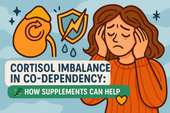
Cortisol Imbalance in Co-Dependency: How Supplements Can Help
Cortisol is the body’s main stress hormone—essential for energy and focus, yet harmful when chronically elevated. When life feels like constant pressure, cortisol imbalance can trigger fatigue, anxiety, and mood swings. Learning how to restore balance through rest, nutrition, and the right supplements can help you rebuild calm, clarity, and resilience from the inside out. 🌿💫
-
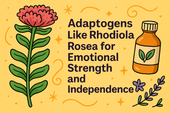
Adaptogens Like Rhodiola Rosea for Emotional Strength and Independence
Adaptogens are nature’s stress-balancing herbs—plants like Rhodiola, Ashwagandha, and Holy Basil that help your body adapt to emotional and physical pressure. They don’t numb or overstimulate; they teach your system how to find calm and stability again. By restoring balance to your hormones, energy, and mood, adaptogens nurture emotional resilience and grounded strength. 🌿✨
-
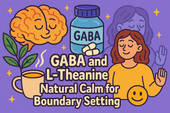
GABA and L-Theanine: Natural Calm for Boundary Setting
Anxiety can feel like a storm inside your mind—constant tension, overthinking, and the inability to relax even when you’re safe. But beneath the chaos, your body is simply trying to protect you. Learning to calm anxiety starts with understanding how your brain and nervous system respond to stress—and how to gently guide them back to peace. 🌿💫
-
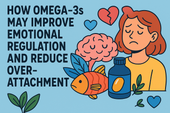
How Omega-3s May Improve Emotional Regulation and Reduce Over-Attachment
Inflammation isn’t just about sore joints or fatigue—it’s also a hidden driver of mood swings, anxiety, and emotional burnout. When chronic stress or poor diet keep the body inflamed, the brain’s chemistry changes, making calm harder to access. Learning how to reduce inflammation through nutrition, rest, and mindful living helps restore balance from the inside out. 🌿💫
-
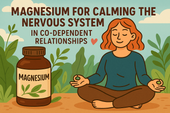
Magnesium for Calming the Nervous System in Co-Dependent Relationships
The nervous system is the body’s communication network, linking your mind and organs through a delicate web of electrical signals. It controls everything from emotional responses to muscle movement—and when it’s overwhelmed by chronic stress or anxiety, balance is lost. Learning how to calm and nourish your nervous system through nutrition, mindfulness, and rest can restore peace and emotional stability. 🌿💫
-
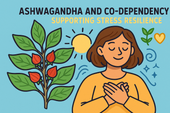
Ashwagandha and Co-Dependency: Supporting Stress Resilience
Stress is more than a feeling—it’s a full-body signal that your system is overwhelmed. When the mind races and the body tenses, your hormones, breathing, and focus all shift into survival mode. Chronic stress doesn’t just affect emotions—it reshapes your nervous system, drains your energy, and clouds your clarity. Learning to understand and manage stress gently is the first step toward peace, balance, and true recovery. 🌿💫
-

Why Co-Dependency Feels Draining: Adrenal Fatigue and Supplements That Help
The adrenal glands are small but powerful organs that sit above your kidneys, acting as your body’s built-in stress managers. They produce hormones like cortisol and adrenaline that help regulate energy, mood, and resilience. When they’re overworked from chronic stress or emotional exhaustion, fatigue and imbalance follow. Supporting adrenal health naturally can help restore calm, energy, and hormonal balance. 🌿⚡
-

The Link Between Anxiety, Co-Dependency, and Natural Support
Anxiety feels like living in constant alert mode—your heart races, your thoughts loop, and your body can’t find peace. It’s the nervous system’s way of preparing for danger, even when none exists. Understanding what’s happening in your mind and body is the first step toward calming the storm and restoring balance. 🌿💫
-

Supplements That Support Dopamine and Serotonin in Co-Dependent Patterns
Serotonin is the neurotransmitter of calm, confidence, and contentment. When it’s balanced, you feel peaceful and emotionally grounded. When it’s low, anxiety, mood swings, and emotional dependence take over. By understanding serotonin’s role in emotional health—and how to support it naturally—you can rebuild inner stability, improve relationships, and cultivate lasting happiness from within. 🌞💫
-

What Is Co-Dependency? The Role of Brain Chemistry and Stress
Stress is more than a feeling—it’s a full-body experience that begins in the brain and ripples through every cell. When cortisol surges and the nervous system stays on alert, your body can’t rest or recover. Over time, this constant tension affects energy, focus, mood, and even immune health. Understanding stress chemistry is the first step toward breaking free from burnout and finding calm again. 🌿
-

Creating a Supplement Stack for Motivation, Energy, and Anti-Procrastination
Motivation is the fuel behind every meaningful achievement—but it’s not just about willpower. It’s a mix of mindset, brain chemistry, and momentum. When energy, focus, and purpose align, action feels natural instead of forced. Learn how to harness motivation as a daily state, not a fleeting feeling.
-

Supplements for Building Consistency and Reducing Chronic Procrastination
Biochemistry is the bridge between biology and chemistry—the science of life at the molecular level. It explains how nutrients, hormones, and neurotransmitters interact to create energy, thought, and emotion. From brain function to muscle movement, biochemistry reveals the invisible processes that sustain health, balance, and vitality.
-

GABA and Procrastination: Supporting Calm Focus for Productivity
GABA is the brain’s natural calming messenger—a neurotransmitter that helps slow mental overactivity and ease stress. When GABA levels drop, focus fades, anxiety rises, and procrastination becomes more likely. By supporting GABA through nutrition, lifestyle, and supplements, you can restore calm clarity, improve focus, and take action with steady, balanced energy.
-

Ashwagandha and Procrastination: Lowering Stress to Improve Action
Science is the language of curiosity and discovery. It helps us understand the hidden patterns behind life, energy, and the universe. Through experimentation and critical thinking, science connects imagination to evidence—turning questions into knowledge. Whether through microscopes, molecules, or minds at work, science represents our endless pursuit of truth and innovation.
-

Neurotransmitters and Motivation: Supplements That Support Drive and Focus
Supplements can do more than boost physical health—they can also enhance mental clarity, focus, and motivation. Nutrients like omega-3s, magnesium, B vitamins, and adaptogens help balance neurotransmitters, stabilize mood, and support brain energy. When combined with good sleep, nutrition, and mindful habits, they can transform how your brain performs under stress.
-

How Stress Hormones Like Cortisol Fuel Procrastination (and What Helps)
Blood sugar isn’t just about physical health—it directly impacts focus, mood, and motivation. When glucose levels spike and crash, energy and attention do the same, fueling procrastination and brain fog. Learning how to stabilize blood sugar through balanced meals, mindful habits, and key nutrients helps keep your mind steady, focused, and ready to act.
-

Brain Fog and Procrastination: Supplements for Mental Clarity
Brain fog can turn even simple tasks into mental hurdles. When your thoughts feel slow and unclear, procrastination often follows—making focus and productivity seem impossible. This article explores the biochemical and lifestyle causes of brain fog and reveals the most effective supplements for restoring mental clarity, focus, and sustained energy.
-

The Link Between Low Energy and Procrastination: Can Supplements Help?
Neurochemistry shapes how we think, feel, and act. When neurotransmitters like dopamine, serotonin, and GABA fall out of balance, it can lead to fatigue, anxiety, or lack of motivation—fueling procrastination and low mood. Understanding the brain’s chemical communication system helps us find ways to restore focus, calm, and emotional stability through nutrition, mindfulness, and targeted supplements.
-

Why Do We Procrastinate? The Role of Dopamine and Supplements That Support It
Dopamine is the brain’s motivation messenger—the chemical that fuels focus, reward, and drive. When dopamine levels drop, even simple tasks can feel impossible to start. This article explores how dopamine shapes procrastination, motivation, and mental energy, along with natural supplements and daily habits that help restore balance and get things done.
-

Phosphatidylserine and Stress Reduction for People with BDD
Stress is more than a mental state—it’s a full-body experience that affects hormones, brain chemistry, and emotional balance. For people with Body Dysmorphic Disorder (BDD), constant tension and worry about appearance can overload the nervous system. Learning how stress works and finding ways to calm it is key to breaking the cycle of anxiety and self-criticism.
-

How Antioxidants Like Vitamin C & E Support Mental Health in BDD
Antioxidants are the body’s natural defense against stress and inflammation. For people with Body Dysmorphic Disorder (BDD), oxidative stress can worsen fatigue, anxiety, and emotional imbalance. Nutrients like Vitamin C and E help protect brain cells, boost neurotransmitter function, and support a calmer, clearer mindset—building a stronger foundation for recovery.
-

Ginkgo Biloba and Memory Support for BDD Recovery
Emotional regulation is the foundation of healing from Body Dysmorphic Disorder (BDD). When the nervous system stays in constant overdrive, even small stressors can trigger self-critical spirals. Learning to calm emotional reactivity helps restore clarity, confidence, and a sense of inner balance. By blending mindfulness, nervous system support, and self-compassion, you can retrain your brain to respond—not react—to emotion.
-

Alpha GPC and Cognitive Function in Body Dysmorphic Disorder
Mental fatigue can feel like your brain has hit a wall—thoughts slow down, focus fades, and motivation disappears. For people with Body Dysmorphic Disorder (BDD), chronic overthinking, emotional stress, and constant self-evaluation can deplete mental energy even further. Understanding what causes this cognitive exhaustion is the first step toward recovery—through rest, balanced nutrition, and targeted brain-supporting supplements.
-

N-Acetyl L-Tyrosine and BDD: Supporting Mental Clarity
Chronic stress doesn’t just affect your mood—it reshapes your brain chemistry, weakens focus, and fuels the obsessive thought loops common in Body Dysmorphic Disorder (BDD). Over time, constant cortisol elevation drains mental energy and emotional balance. Learning to recognize and manage chronic stress is essential to restoring mental clarity, self-compassion, and resilience.
-

Chamomile and Lavender for Calming Obsessive Body Image Thoughts
The nervous system is the command center of our emotional and physical world—and in Body Dysmorphic Disorder (BDD), it often operates in overdrive. Understanding how the brain and body communicate under stress reveals why intrusive thoughts feel uncontrollable. Learning to regulate the nervous system through calm practices, nutrition, and supplements helps restore inner balance and emotional safety.
-

Adaptogens for Body Dysmorphic Disorder: Rhodiola, Ginseng, and More
Rhodiola rosea, often called the “golden root,” is an adaptogenic herb renowned for boosting stress resilience and mental endurance. For individuals with Body Dysmorphic Disorder (BDD), Rhodiola may help reduce fatigue, regulate cortisol, and enhance emotional balance. By supporting both mind and body, this powerful plant promotes calm focus, improved mood, and renewed energy to face daily challenges.
-

B Vitamins for Stress Resilience in BDD: Rebuilding Calm from Within
Biochemistry is at the heart of every thought, emotion, and reaction we experience. In Body Dysmorphic Disorder (BDD), chemical imbalances in neurotransmitters like serotonin, dopamine, and GABA can amplify stress and distort self-perception. Understanding the biochemistry behind mood and stress regulation offers a path toward healing—bridging the gap between emotional experience and the body’s molecular balance.
-

Melatonin and Body Dysmorphic Disorder: Restoring Healthy Sleep Patterns
Melatonin, the body’s natural sleep hormone, plays a vital role in helping people with Body Dysmorphic Disorder (BDD) restore healthy sleep cycles. When anxiety and obsessive thinking interfere with rest, melatonin levels often drop, leading to more emotional reactivity and distorted self-perception. This article explores how melatonin works, why BDD disrupts it, and how natural supplementation—combined with mindful routines—can help the brain and body finally find calm at night.
-

Sleep Struggles with BDD: Supplements for Rest and Recovery
When you’re living with Body Dysmorphic Disorder (BDD), restful sleep can feel impossible—but the right supplements can help reset your body’s natural rhythm. From magnesium and L-theanine to 5-HTP and ashwagandha, these nutrients support relaxation, lower cortisol, and enhance melatonin production. This article explores how supplements can calm the mind, ease nighttime anxiety, and promote true restorative sleep for emotional and physical recovery.
-

5-HTP and Serotonin Balance: Could It Help with Body Dysmorphic Disorder?
Anxiety can feel like a storm inside the mind—restless, overwhelming, and hard to control. In people with Body Dysmorphic Disorder (BDD), anxiety often fuels obsessive thoughts and self-criticism, creating a painful cycle of worry and self-doubt. This article explores the biological roots of anxiety, the role of neurotransmitters like serotonin and GABA, and how natural strategies such as mindfulness, supplements, and nervous system regulation can restore calm and mental clarity.
-

Can Ashwagandha Help Ease Stress and Anxiety in Body Dysmorphic Disorder?
Neurotransmitters like serotonin, dopamine, GABA, and acetylcholine are the chemical messengers that shape how we think, feel, and react to stress. In Body Dysmorphic Disorder (BDD), imbalances in these neurotransmitters can amplify anxiety, obsessive thinking, and emotional distress. This article explores how restoring healthy brain chemistry through nutrition, supplements, and mindfulness can help bring clarity, calm, and emotional stability.
-

L-Theanine for BDD: Finding Calm in the Mind
Neurochemistry plays a central role in how we think, feel, and see ourselves. For those living with Body Dysmorphic Disorder (BDD), imbalances in neurotransmitters like serotonin, dopamine, and GABA can intensify anxiety, obsessive thoughts, and emotional distress. This article explores how regulating brain chemistry through supplements, mindfulness, and lifestyle changes can bring the nervous system back into harmony and restore inner calm.
-

Omega-3 Fatty Acids and Body Image Disorders: Supporting Emotional Health
Omega-3 fatty acids do far more than support heart health—they nourish the brain, stabilize mood, and may ease the emotional turbulence tied to body image disorders like BDD. This in-depth article explores how omega-3s regulate serotonin, dopamine, and inflammation, helping individuals reduce obsessive thoughts and rebuild self-acceptance. It also connects nutrition to therapy, mindfulness, and nervous system balance for holistic emotional healing.
-

Magnesium and BDD: Calming an Overactive Nervous System
Magnesium plays a crucial role in calming an overactive nervous system—something people with Body Dysmorphic Disorder (BDD) struggle with daily. This article explores how magnesium supports relaxation, emotional regulation, and stress reduction while diving into the science behind its connection to brain chemistry. It also examines how combining magnesium supplementation with therapy and breathwork can help rebalance the body’s stress response, reduce obsessive thought patterns, and promote lasting nervous system calm.
-

The Gut-Brain Axis and BDD: Why Probiotics Might Matter
The gut and brain are constantly in conversation — and that dialogue may shape how you experience Body Dysmorphic Disorder. By nurturing your microbiome with probiotics, prebiotics, and gut-healing nutrients, you can help rebalance serotonin, calm anxiety, and restore emotional stability from within 🧠🦠.
-
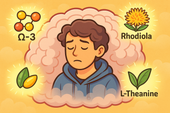
Brain Fog and Body Dysmorphic Disorder: Can Nootropic Supplements Help?
Brain fog often accompanies Body Dysmorphic Disorder, clouding focus and deepening emotional fatigue. Nootropic supplements like L-theanine, Rhodiola, and CoQ10 can help restore mental clarity, balance neurotransmitters, and bring calm energy back to the mind 🌿🧠.
-

How Stress Hormones Like Cortisol May Worsen Body Dysmorphic Disorder
Chronic stress floods the brain with cortisol — the hormone that keeps you on high alert. In Body Dysmorphic Disorder, this chemical overdrive fuels anxiety, distorts self-image, and traps the body in survival mode. Calming cortisol helps restore both peace and perspective 🌿🧠.
-

The Role of Neurotransmitters in BDD—and How Supplements May Help
Neurotransmitters like serotonin, dopamine, glutamate, and GABA shape how people with Body Dysmorphic Disorder perceive themselves. When these brain messengers fall out of balance, perception distorts — but targeted supplements can help restore calm, focus, and emotional regulation 🧠🌿.
-

What Is Body Dysmorphic Disorder? A Deeper Look at the Mind-Body Connection
Body Dysmorphic Disorder (BDD) isn’t just about appearance — it’s about perception. When brain chemistry, trauma, and stress distort self-image, the mind begins to see flaws that aren’t truly there. Healing starts by calming the nervous system and reconnecting mind and body 🪞🧠.
-

Keeping Calm in Competitive Sports: How to Train Your Mind, Body, and Chemistry for Peak Performance
Competitive pressure can overwhelm even the strongest athletes — but calm is trainable. By combining supplements like magnesium, L-theanine, and adaptogens with breathwork and mindset training, you can stay focused, balanced, and in control under any level of stress 🧠🏅.
-

Supplements for Parents Facing Toddler Tantrums: Staying Calm When Little Emotions Run Wild
Toddler tantrums can drain even the most loving parent — but your calm is powerful. With the right supplements like magnesium, L-theanine, and ashwagandha supporting your nervous system, you can stay patient, grounded, and kind, even when emotions run high 🧸🌿.
-

Workplace Stress and Anger Management Support
Workplace stress can quickly turn into frustration — but calm is a skill you can train. By combining supplements like magnesium, L-theanine, and adaptogens with breathwork and mindset tools, you can stay focused, patient, and emotionally grounded no matter how intense the office gets 💼🌿.
-

How to Stay Patient With Family During Stressful Holidays
Holiday gatherings can stir up old stress and test your patience — but calm is possible. With nervous system support from magnesium, L-theanine, and adaptogens, plus mindful breathing and clear boundaries, you can stay centered, kind, and grounded even when family chaos unfolds 🎄💞.
-

Supplements to Keep Calm During Traffic Jams
Getting stuck in traffic doesn’t have to ruin your mood. With calming supplements like magnesium, L-theanine, and ashwagandha, you can train your body to stay relaxed and focused behind the wheel — turning gridlock into a moment of grounded patience 🚗🌿.
-
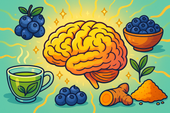
The Role of Antioxidants in Healing Brain Stress from Dissociation
Antioxidants protect the brain from the oxidative stress caused by trauma and dissociation. By neutralizing free radicals and supporting mitochondrial recovery, they help restore clarity, focus, and emotional balance — allowing the mind to heal at the cellular level 🌿🧠.
-
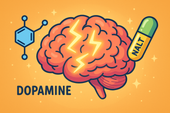
N-Acetyl L-Tyrosine (NALT) for Supporting Mental Clarity
N-Acetyl L-Tyrosine (NALT) fuels dopamine production — the neurotransmitter of focus and motivation. By supporting brain chemistry during stress, NALT helps restore mental clarity, energy, and alertness, making it easier to think clearly and feel present again ⚡🧠.
-

How Ginseng May Improve Focus and Energy in Dissociation
Ginseng helps combat the mental fatigue and fog that often come with dissociation. By supporting mitochondrial energy, balancing neurotransmitters, and regulating cortisol, it gently restores focus, motivation, and emotional presence — helping the mind reconnect with clarity and strength 🌿⚡.
-
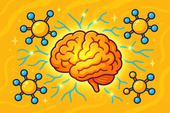
Phosphatidylserine and Dissociation: Supporting Cognitive Function
Phosphatidylserine helps calm the stress response by balancing cortisol, the body’s primary stress hormone. By lowering cortisol spikes, it protects memory, focus, and emotional stability — restoring clarity and mental presence for those struggling with dissociation 🧠🌿.
-
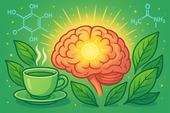
Can Green Tea Extract Help with Dissociative Brain Fog?
Green tea extract may help lift dissociative brain fog by supporting neurotransmitter balance, reducing inflammation, and enhancing energy at the cellular level. With its key compounds EGCG and L-theanine, it promotes calm focus, clarity, and emotional presence — helping you feel more alert and grounded 🍵🧠.

















































